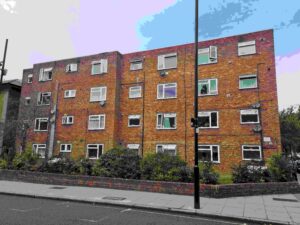
Most people might assume that flats are warmer than houses. After all, every flat has at least one other dwelling above or below it, making it a lot more difficult for heat to escape. Flats tend to be newer than houses, with more modern construction, glazing and insulation features.
And across the English housing stock the average energy efficiency of a flat is indeed higher than that of a house. But that fact masks the problem that we’re not improving our older flats with energy efficiency upgrades at the same rate as we are our houses.
See also: A leasehold reform bill for retrofit ; France’s policies for blocks of flat retrofit
One reason – perhaps the main reason – we’re failing to insulate flats is the challenge of reaching agreement for works to proceed. A large number of different parties can have a title to, or responsibility for, any given block of flats: freeholders, leaseholders, short-term tenants and management companies. Getting agreement for building-wide improvement works is inevitably problematic.
Leases on flats – the legal documents – add to the difficulty. They’re complex and often inconsistent documents. One lease might say that a window frame is the freeholder’s responsibility while the glass within it is the leaseholder’s. In other situations the whole window unit will fall to one party or other. The vast majority of leases make no reference to energy efficiency improvements: so freeholders (or leaseholders exercising their “Right to Manage”) can’t undertake the upgrades spreading the costs between the leaseholders. Leases can also restrict what improvements a leaseholder can make within their own flat.
In Scotland property law is different and very few flats are owned leasehold (so in a block of flats each flat owner will also own a share of the common areas). Of course, it’s still difficult to get multiple flat owners to agree to improve the building but the government has taken some steps to make life easier – most noticeably redefining the installation of insulation as a “maintenance” in the Climate Change Scotland Act 2009.
How can we make it easier to make energy efficiency improvements on blocks of flats?
Idea 1 -provide some official information to the owners of blocks of flats
Every dwelling – house or flat – has to have an Energy Performance Certificate when it is rented out. But there’s no official route for advice or guidance on what can be done to improve the whole block in which a flat sits. Should whoever is officially managing a block should be required to have a whole building energy survey, perhaps every five or ten years?
Idea 2 – Make it easier for freeholders or majority groups of leaseholders to take action on energy efficiency in the block.
New legislation could over-ride or imply a change in terms of all current leases, allowing freeholders or groups of leaseholders to make energy efficiency upgrades and share the costs. There are different ways this could be done and consideration would need to be given as to what are reasonable improvements and the level of agreement required for works to proceed.
For new blocks of flats, we need to make sure that new leases allow for energy efficiency improvements. That could be done through legislation, or by making sure that lawyers are more aware of this as an important standard provision when they prepare new leases.
Idea 3 – making it easy for action on energy efficiency in individual flat
A law could override clauses in leases that prohibit alterations within flats, where these are energy efficiency improvements and where such alterations do not damage the structure of the building.
Most of these ideas will require legislative change (and in this report from Oxford University Law Faculty we explore in much more detail how these ideas could work). So they’re not small steps. But they could make a big difference for the energy efficiency industry and people living in cold homes, and they don’t require a complete rewrite of English property law.
Blocks of flats should be among the easiest buildings to make energy efficient. But the law is preventing action. We’d like to hear your views on the proposals we’re putting forward.